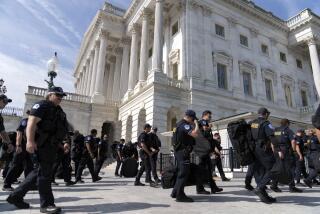Reagan Doesn’t Back Mubarak Call for Talks
- Share via
WASHINGTON — Palestinians must be represented “at all stages” of Middle East peace negotiations, President Reagan said Tuesday, but he stopped well short of endorsing Egyptial President Hosni Mubarak’s call for U.S. talks with a Jordanian-Palestinian delegation approved by the Palestine Liberation Organization.
Mubarak, making his third visit to Washington since he succeeded the late President Anwar Sadat, warned that unless the United States takes a more active role in trying to mediate an agreement between Israel and its Arab neighbors, the world is in danger of missing “a golden opportunity for peace.”
‘My Dear Friend’
Although Reagan and Mubarak spiced their public comments with phrases like “my dear friend,” U.S. officials left little doubt that the Egyptian president failed to win much support for either of his two major requests--for a new U.S. peace effort and for $870 million in emergency foreign aid.
However, a senior U.S. official said the door was left open for additional discussion on both matters.
Reagan hinted that Egypt will eventually get some of the aid increase that it seeks. “Egypt faces economic difficulties.. We’ll be giving sympathetic consideration to what we can do to help,” he said.
Joint Initiative
Mubarak, meanwhile, urged the United States to offer encouragement to the so-called framework agreement signed last month by Jordan’s King Hussein and PLO leader Yasser Arafat calling for a joint Jordanian-PLO peace initiative.
He called on American officials to meet with a Jordanian-Palestinian delegation as a prelude to direct talks with Israel.
Standing beside Reagan after they emerged from the White House, Mubarak said: “The Jordanian-Palestinian agreement to pursue a peaceful settlement is a major development that should not be discounted or discarded. We cannot afford another missed opportunity for peace.”
Reagan offered an oblique reply later in his toast at a dinner honoring the Egyptian leader: “one question that we must address forthrightly is how the Palestinians should be represented. Mr. President (Mubarak), you have wisely stressed the need for practicality. In our quest for peace, we reaffirm with you that in all stages of the negotiating process there should be Palestinian participation.
“As we have said many times before, these Palestinians should include representatives from the (Israeli-occupied) West Bank (of the Jordan River) and Gaza (Strip) and other Palestinians as mutually agreed by the parties,” he said. “These are wide parameters. They provide ample scope--they should be put to use.”
That formula for Palestinian participation is similar to the one contained in the Camp David accords of 1978. At that time, it was assumed that the Palestinian delegation would include the elected mayors of major West Bank towns plus other Palestinian leaders acceptable to all the parties--including Israel, which refuses to deal in any way with the PLO, which it considers a terrorist organization.
Needs PLO Backing
However, most West Bank and Gaza Palestinians have made it clear that they would not serve on any delegation that excluded the PLO, and Arab countries have insisted that the PLO be represented in the peace process.
Mubarak had hoped to finesse the PLO issue by suggesting that a Jordanian-Palestinian delegation could include Palestinians not publicly associated with the PLO--although clearly approved by it.
The senior U.S. official described Mubarak’s plan as “a serious effort.”
“We are still asking some questions about,” the official said. “A meeting in isolation wouldn’t serve President Mubarak’s purposes or our purposes or the interests of any of the parties in the area.”
When an Egyptian reporter asked if the United States would participate in talks with a Jordanian delegation including Palestinians who were not PLO members, other reporters, unable to hear the question, asked that it be repeated. As the reporter started to ask it again, the official broke in: “Don’t bother to repeat the question. The answer is, there is no answer to that.”
Harold H. Saunders, former assistant secretary of state for Near Eastern and South Asian affairs, at a briefing for reporters urged the Reagan Administration to be more positive in its assessment of Mubarak’s peace proposals and the related Hussein-Arafat agreement.
“The Administration has been calling for some kind of Arab initiative,” Saunders said. “Now it has two of them--so it has to do something.”
More to Read
Sign up for Essential California
The most important California stories and recommendations in your inbox every morning.
You may occasionally receive promotional content from the Los Angeles Times.










